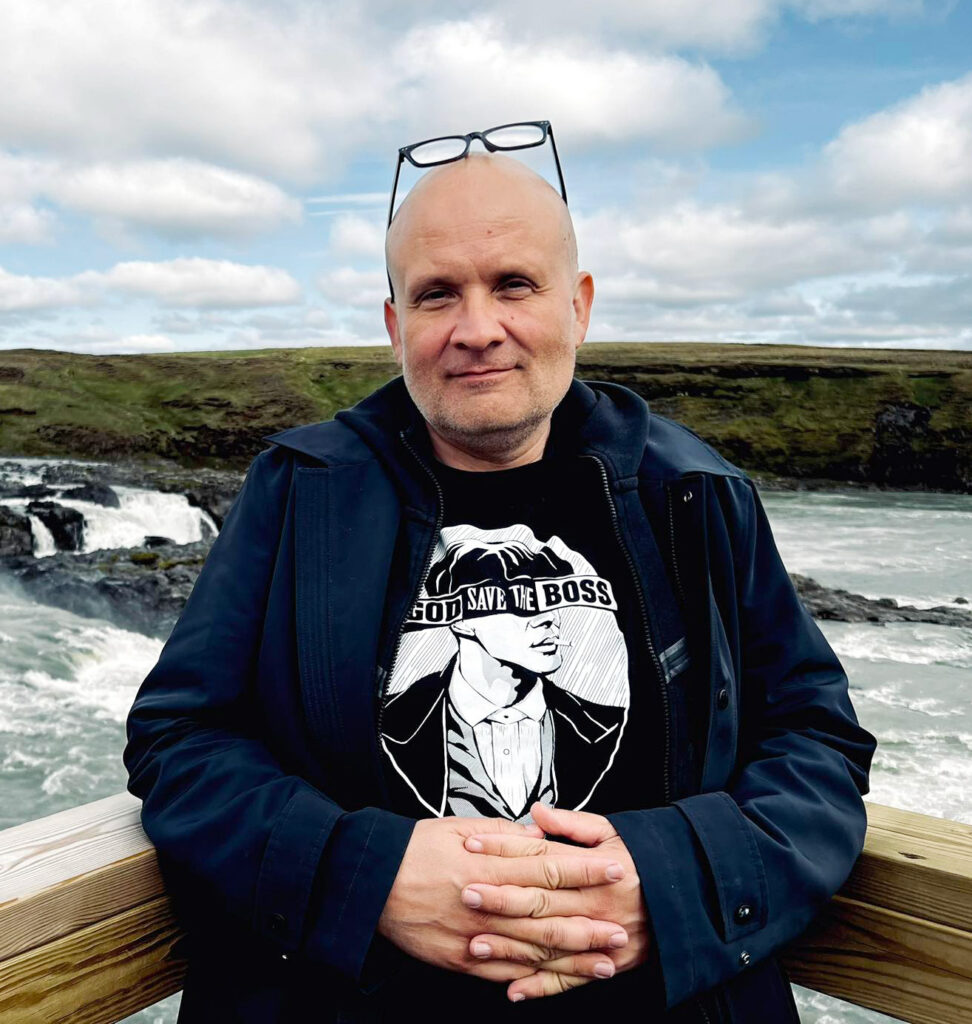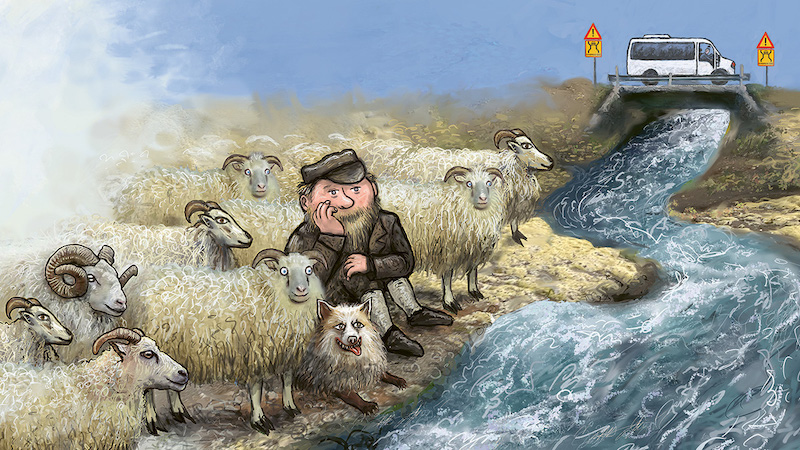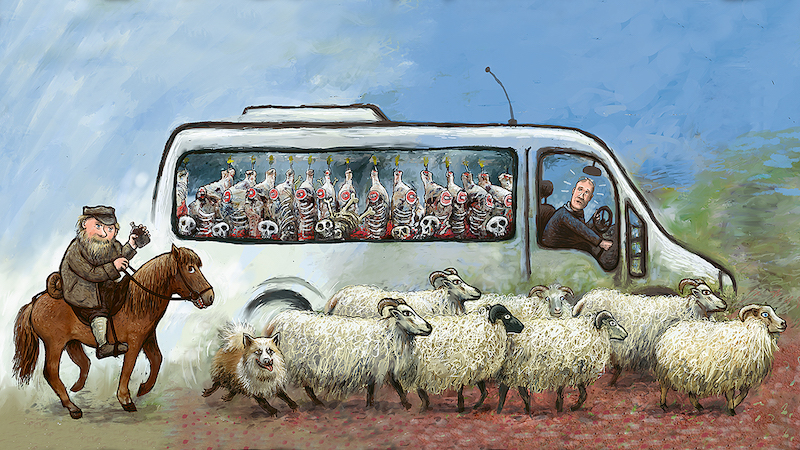Free and exclusive discount codes for hundreds of tours and & travel services in Iceland
Subscribe to instantly receive discount codes for tours, car rental, camper van rental, and outdoor clothing rental. Thank you! ❤️ Jon Heidar, Editor of Stuck in Iceland Travel MagazineI am delighted to introduce you to my multi-talented friend, Þórarinn Leifsson, known to most people as Tóti. A native of Reykjavík, Tóti Leifsson is a celebrated author, illustrator, and freelance driver guide, fluent in English, Spanish, German, Danish, and his native Icelandic. His diverse skill set has shaped his perspective on Iceland’s historical and present-day context, enabling him to translate his experiences and insights into compelling narratives.
A new book about Tóti’s granddad is coming out
Today’s conversation concerns Tóti’s latest work, “Great Granddad and the Vanishing Glacier,” which will be available this summer in four separate language editions; Icelandic, English, German, and Spanish.

This 66-page illustrated gem vividly depicts his great-grandad’s experiences herding sheep across the Icelandic landscape, juxtaposed with Tóti’s experiences guiding travelers in the same areas today. True to his reputation, Tóti does not shy away from the grotesque. One central illustration depicts a great-grandad hoarding his sheep beside a modern-day tour bus full of what appears to be animal corpses. The artist points out that his passengers are not slaughtered at the end of an excursion like his Great-granddad’s sheep a hundred years prior. The book is a poignant commentary on Iceland’s shifting environment and lifestyle over the past century, one focal point being the change in how modern man experiences time passing. Great-granddad waited a whole day before he could cross a dangerous stream while modern-day Tóti drives across the same river in his minibus in the blink of an eye.

An illustrious career
Tóti’s work has been lauded internationally, with his stories gracing bookshelves in countries as varied as Denmark, Norway, Germany, and Italy, to name a few. His book, The Man Who Hated Children, was nominated for the prestigious Nordic Council Children’s Literature Prize in 2015. Readers might also remember him from his insightful “The Bench – a Diary from the Golden Circle,” which offered a personal perspective on the Icelandic tourism boom before the COVID-19 pandemic. Not to mention a crazy whodunit novel called „Killing Tourists, “a paperback that sold quite well in Iceland in the Christmas Book Flood of 2021. An English translation will be on the market this year’s end.
The hardest working driver-guide in the business
Tóti is also a driver-guide, and it sure looks like he is one of the hardest-working guys in the Icelandic travel industry. Last May, he drove 7.000 kilometers, or just over 4.300 miles, with his guests. That equals the distance from Reykjavik to Los Angeles. He is well-loved by his guests, which is unsurprising to me.
Corporate Nonni and the free wheeling artist
We have been colleagues; back in the dark ages, or at the turn of the century, we worked together in a dot com startup that failed spectacularly, and shortly after that, we were underpaid grunts who participated in launching one of Iceland’s first news sites. Tóti made fun of me as I was (and still am) a little square. While he was a free-wheeling artist and author, I worked for Iceland’s largest telco and then the most prominent Icelandic bank, which went belly up in the catastrophic Icelandic banking crash in 2008. Apart from stints with several start-ups, I have been toiling in the corporate world while Tóti does what Tóti wants. He used to call me ‘Corporate Nonni,’ but Nonni is the Icelandic nickname for guys called Jon. A nickname that I have now resurrected and may stick, unfortunately. These days we mostly meet at the sweat-stained gym Mjölnir, where we both struggle to keep up with the young and beautiful.
Hey Tóti Leifsson, thank you for taking the time for this interview. I share your fascination with how the lives of Icelanders have been transformed over the past century. In the book, you illustrate how your ancestors fought for their lives in an unforgiving environment. What gave you the idea for the book?
Hey Nonni! It was my job as a tour guide that gave me the idea. I started taking tourists for a spin from Reykjavík in the summer of 2018, gradually including stories about my great-grandad, partly to make sense of my new life. I started to think about an illustrated book based on those stories about two years ago. At the same time, I was thinking about power point presentations I had done in the past in schools in Denmark, Germany, and Italy. In my pre-tour guide life, I did not talk much about my country; my visuals were based on my background in classic European painting, and the stories were significantly influenced by my growing up in Reykjavík and Copenhagen. That whole outlook has changed dramatically since I became a guide five years ago.
Celebrating Icelandic roots
I have strong roots on this rocky island, for better and for worse. Once I even worked as a cowboy on a farm close to Reykholt from age nine. I also wanted to tell a story with less text and get back to my origins as an illustrator and painter. So I bought an iPad Pro a year ago and started working on it.
Your book is thoroughly well-researched. Did you have to dig deep for information about your ancestors’ lives?
The story is based on my great-granddad’s memoirs, published in 1947, a year before he died. I do, however, take quite a few liberties. Not sure if my relatives will buy that rehab elves hijacked our great-granddad to give an example. But an author always has to take liberties. My aunt, Hildur Hakonardottir, had given me my great-grandad’s memoirs a few years before I became a tour guide. A bit like she predicted what would happen. Some people think she is a Witch, albeit a good one.
You have always been a very free-wheeling person. Has the research and writing of this book changed your outlook on life?
The guiding experience, getting to know Iceland, and my roots have changed me. The illustration work has reminded me that I have a unique voice. I must not let the written text fixation of Icelandic mainstream culture kill my mojo.
Where can my readers from all over the world get the book?
It will be challenging since I am printing high-quality copies in limited quantities. The first copies will be signed and numbered. The Icelandic and English editions will be in some local bookstores and gift stores in Iceland by mid-summer. Furthermore, translations to German and Spanish will be ready in August or September. Interested buyers can contact me via social media, website, or email.
You have told me that you have a cyclical life. You work hard guiding travelers and then disappear abroad to write. Can you reveal what your next book is going to be about?
Right now, I am working on illustrations for the Icelandic Christmas cat that I have been commissioned to do by the heirs of Jóhannes úr Kötlum, a classic Icelandic author. I am also working on two other manuscripts that I have been boiling on a low fire for quite a while: one crime novel and one children’s book.
What are your favorite activities or places to visit here in Iceland?
I have quite a lot of favorite places by now because each year, I find new spots. East fjords in the Djúpavogur area are high on the list,. So is Lake Mývatn and the desert in the northeast north of Vatnajökull glacier. Berserkjahraun is close to my heart. And finally, Mýrdalur, the roots of my mother’s family. As for activities, I would say hanging out with family. I am a true patriarch, and I love to hang out with my kids, granddaughter, or girlfriend. I also like the contrast between coming home from tours around Iceland and enjoying what city life has to offer.
What advice do you have for those visiting Iceland for the first time?
To be flexible and always have a plan b in case of bad weather. Be patient and think positively at all times.
Tóti can be found at www.totil.com and on Instagram.





